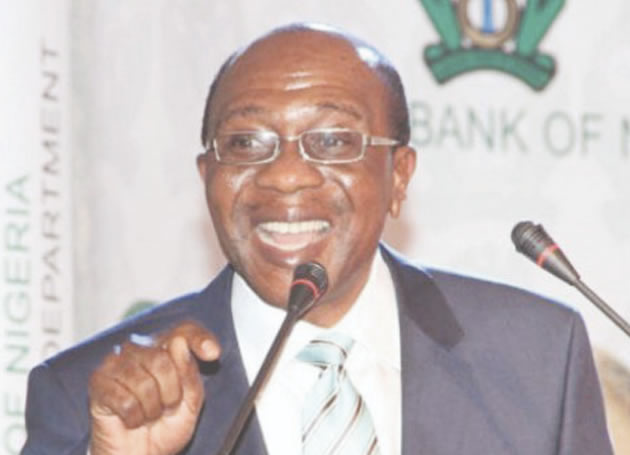Business News
CBN Promises Tight Monetary Policy, Lists Priorities in 2020

By Tony Obiechina, Abuja
The Governor, Central Bank of Nigeria (CBN), Mr. Godwin Emefiele has said that the Bank’s top priorities for 2020 will include support for greater economic growth, price stability and low inflation.
The Governor who restated the Apex Bank’s continued operation of tight monetary policy at the Banker’s Committee Dinner on Friday night, announced the establishment of a Bankers’ Charitable Endowment Fund.
Emefiele unveiled the bank’s plans for next year while delivering the keynote address titled: “Strong Sustainable Growth for the Nigerian Economy” at the 54th Annual Bankers’ Dinner organized by the Chartered Institute of Bankers of Nigeria (CIBN) in Lagos.
The governor explained that the proposed Bankers’ Charitable Endowment Fund will enable the Bank to fund a major charitable initiative every year, starting in 2020.
According to him, the Bankers’ Charitable Endowment will directly fund strategic social programmes in states and local communities across Nigeria. He expressed the hope that the Fund would spur a trend across other industries and sectors to collaborate and work together to better the lives of all Nigerians.
Speaking on the developments in the country’s economic and financial sector, over the past year, and how they affect the macro-economic outlook for 2020, he said in spite of the positive growth the economy experienced, growth had remained slow due to “some structural constraints” in the economy.
According to him, the pace of growth, given Nigeria’s growing population, exposed the economy to shocks, such as changes in the oil price, and sentiments in the global financial markets.
Disclosing plans by the CBN to support the economic recovery and enable stronger growth for the country’s Gross Domestic Product (GDP), Mr. Emefiele said that the Bank would continue its current tight stance, particularly in view of rising inflation expectations.
“Though we will act to appropriately adjust the policy rate in line with unfolding conditions and outlooks, the CBN will continue to ensure that the policy interest rate is delicately set to balance the objectives of price stability with output stabilization,” he explained.
Recalling the highlights for 2019, Mr. Emefiele stated that the country’s GDP had remained positive, adding that the positive growth in GDP had been driven by improvements in Agriculture, Oil and Gas, Manufacturing and ICT as well as the intervention programmes of the CBN, along with sustained supply of foreign exchange and stability of the naira.
He also attributed the decline in inflation to the Bank’s maintenance of a tighter monetary policy rate at 13.5 percent, and its efforts at improving local production of key staple items.
Speaking further, he said the Nigerian financial system was now stronger due to the fact that capital buffers and liquidity in the banking system have continued to improve.
According to him, industry-wide Capital Adequacy Ratio (CAR) had increased from 10.2 percent in December 2017 to 15.5 percent in September 2019. He added that the percentage of non-performing loans in the banking sector had reduced from a high of 14.7 percent in January 2017 to under 7 percent as at October 2019.
He equally disclosed that credit conditions in the banking system had improved supported by the CBN’s new policy measures announced in June 2019, which require banks to maintain a minimum 65 percent loan to deposit ratio.
The Governor further stated that banks in the country are now able to recover delinquent loans from customers’ accounts in other banks, adding that the measures now placed Nigerian banks in a much better position towards supporting a stronger economic recovery.
This, he added, had increased gross credit by N1.16 trillion between May and October 2019.
On the country’s External Reserves, the Governor said the Bank’s effort at supporting domestic production in the agriculture and manufacturing sectors among other policies, had continued to encourage foreign exchange inflows into the Nigerian market.
According to him, over $60 billion worth of transaction had taken place since the inception of the Investors’ and Exporters’ window in April 2017, adding that Nigeria’s foreign exchange reserves were above $40bn as at October 2019, compared to $23bn in the same period in 2016.
The Governor also highlighted the Bank’s effort in development financing, which he said the CBN had sustained in order to help support growth in critical sectors of the economy such as agriculture and the manufacturing sectors, through programmes such as the Anchor Borrowers’ Programme, the Commercial Agriculture Credit Scheme and the Bankers Committee Agri-Business/Small and Medium Enterprises Investment Scheme(AGSMEIS).
Alluding to the economic face-off between some countries, as well as the likely challenges the economy could face due to moderate oil prices, he stressed the need for Nigeria to build up the necessary buffers that would protect the economy from pressures in the global market.
He then restated the need to boost local production and diversify the country’s export base.
“We should encourage Nigerians to consume goods that can be produced in Nigeria, knowing full well that a time will come when we may not have the foreign exchange to aid such activities, if we continue to rely on earnings from the export of crude oil,” he emphasized.
Recalling the country’s economic glorious past when the economy was heavily reliant on agriculture, with increased cultivation and exports of primary products such as cocoa, palm oil, cotton and groundnut, Emefiele posited that it possible to envision a productive Nigerian economy that is not reliant on exports of crude oil.
The Governor urged all stakeholders to believe in Nigeria’s greatness, stressing that the country was blessed with abundant human and natural resources, which if truly harnessed would propel Nigeria into one of the world’s top 20 economies.
“We must redouble our efforts to continue to support actions by the monetary and fiscal authorities to diversify the base of the Nigerian economy through encouragement of made in Nigeria products.
“We must also consume what we produce and produce what we consume. We must discourage the propensity to import what can be produced in Nigeria. This is because if we do not reduce import, the same imports will kill us knowing full well that such activities do not aid our efforts to create jobs and support the growth of our local industries.
“If we choose to follow the trend of supporting imports of goods that can be produced in Nigeria, we will lose jobs, our industries will die and insecurity and other social vices in our land will continue to increase. We must choose this alternative path of improving domestic production, which will support growth of our local economy,” he charged.
As part of the Bank’s priorities for 2020, he said the CBN was determined to maintain its stable exchange policy stance in the near to medium term given the relatively high level of reserves. He said the Bank would also sustain these efforts in 2020 as part of our plan to reduce our financial exclusion rate to under 20 percent over the next year.
The Governor said the Bank will also improve access to credit for farmers and SMES by deepening its intervention efforts through the Anchor Borrowers’ Programme, Commercial Agriculture Credit Scheme and the Real Sector Support Funds, amongst others.
Similarly, he said the Bank, in pushing to improve access to finance and credit, would protect them from unfair banking and lending practices by maintaining oversight on the banks and other financial institutions.
In addition to making sure that financial institutions support the growth of the real sector, Mr. Emefiele said the CBN, working with the Nigerian Export Import Bank (NEXIM), improve access to the N500bn facility designed to support the growth of Nigeria’s non-oil exports.
While disclosing that the Bank, working with the fiscal authorities, will support the recovery of the economy, the CBN Governor reiterated that Nigeria was open to business and urged investors to take advantage of the investment opportunities in Nigeria. He assured that investments in Nigeria would be duly protected by the authorities.
Business News
Tinubu Congratulates Dangote on World Bank Appointment

By Jennifer Enuma, Abuja
President Bola Tinubu has congratulated Alhaji Aliko Dangote, the President of Dangote Group, on his appointment to the World Bank’s Private Sector Investment Lab, a body tasked with promoting investment and job creation in emerging economies.
In a statement by Special Adviser on Media and Publicity, Bayo Onanauga, the President described the appointment as apt, given Dangote’s rich private sector experience, strategic investments, and many employment opportunities created through his Dangote Group.
The Dangote Group became one of Africa’s leading conglomerates through innovation and continuous investment.
Dangote Group’s business interests span cement, fertiliser, salt, sugar, oil, and gas. However, the $20 billion Dangote Petroleum Refinery and Petrochemicals remains Africa’s most daring project and most significant single private investment.
“President Tinubu urges Dangote to bring to bear on the World Bank appointment his transformative ideas and initiatives to impact the emerging markets across the world fully” the statement said.

The World Bank announced Dangote’s appointment on Wednesday, as part of a broader expansion of its Private Sector Investment Lab. The lab now enters a new phase aimed at scaling up solutions to attract private capital and create jobs in the developing world.
The CEO of Bayer AG, Bill Anderson, the Chair of Bharti Enterprises, Sunil Bharti Mittal, and the President and CEO of Hyatt Hotels Corporation, Mark Hoplamazian, are on the Private Sector Investment Lab with Dangote.
The World Bank said the expanded membership brings together business leaders with proven track records in generating employment in developing economies, supporting the Bank’s focus on job creation as a central pillar of global development.
Business Analysis
Nigeria Customs Generates over N1.75trn Revenue in 2025
By Joel Oladele, Abuja
The Nigeria Customs Service (NSC) has generated an impressive N1,751,502,252,298.05 in revenue during the first quarter of 2025.
The Comptroller-General (CG) of the Service, Bashir Adeniyi, disclosed this yesterday, during a press briefing in Abuja.
According to Adeniyi, the achievement not only surpasses the quarterly target but also marks a substantial increase compared to the same period last year, reflecting the effectiveness of recent reforms and the dedication of customs officers across the nation.
“This first quarter of 2025 has seen our officers working tirelessly at borders and ports across the nation.
I’m proud to report we’ve made real progress on multiple fronts—from increasing revenue collections to intercepting dangerous shipments,” Adeniyi stated.He attributed this success to the reforms initiated under President Bola Tinubu’s administration and the guidance of the Honourable Minister of Finance and Coordinating Minister of the Economy, Olawale Edun.
The CG noted that the revenue collection for Q1 2025 exceeded the quarterly benchmark of N1,645,000,000,000.00 by N106.5 billion, achieving 106.47% of the target. This performance represents a remarkable 29.96% increase compared to the N1,347,705,251,658.31 collected in Q1 2024.
Adeniyi highlighted the month-by-month growth, noting that January’s collection of N647,880,245,243.67 surpassed its target by 18.12%, while February and March also showed positive trends.
“I’m pleased to report the Service’s revenue collection for Q1 2025 totaled N1,751,502,252,298.05.
“Against our annual target of N6,580,000,000,000.00, the first quarter’s proportional benchmark stood at N1,645,000,000,000.00. I’m proud to announce we’ve exceeded this target by N106.5 billion, achieving 106.47% of our quarterly projection. This outstanding performance represents a substantial 29.96% increase compared to the same period in 2024, where we collected N1,347,705,251,658.31.
“Our month-by-month analysis reveals even more encouraging details of this growth trajectory,” Adeniyi said.
In addition to revenue collection, Adeniyi said the NCS maintained robust anti-smuggling operations, recording 298 seizures with a total Duty Paid Value (DPV) of ₦7,698,557,347.67.
He stated that rice was the most seized commodity, with 135,474 bags intercepted, followed by petroleum products and narcotics.
“From rice to wildlife, these seizures show our targeted approach,” Adeniyi remarked, noting the NCS’s commitment to combating smuggling and protecting national revenue.
Adeniyi also highlighted key initiatives, including the expansion of the B’Odogwu customs clearance platform and the launch of the Authorized Economic Operators Programme, which aims to streamline processes for compliant businesses. The NCS’s Corporate Social Responsibility Programme, “Customs Cares,” was also launched, focusing on education, health, and environmental sustainability.
Despite these achievements, the CG noted that the NCS faced challenges, including exchange rate volatility and non-compliance issues. Adeniyi acknowledged the need for ongoing adaptation and collaboration with stakeholders to address these challenges effectively.
Looking ahead, the NCS aims to continue its modernization efforts and enhance service delivery, ensuring that it remains a critical institution in Nigeria’s economic and security landscape.
“Results speak louder than plans; faster clearances through B’Odogwu, trusted traders in the AEO program, and measurable food price relief from our exemptions. We’ll keep scaling what works,” he concluded.
BUSINESS
NSIA Net Assets Hit N4.35trn in 2024
By Tony Obiechina Abuja
The Nigeria Sovereign Investment Authority (NSIA) yesterday disclosed that its net assets grew from N156bn in 2013 to N4.35 trillion in 2024.
Similarly, the Authority has remained profitable for 12 consecutive years, leading to cumulative retained earnings of N3.
74 trillion in 2024.Managing Director and Chief Executive Officer of NSIA, Aminu Umar- Sadiq made these disclosures at a media engagement in Abuja, highlighting its audited financial results for the 2024 fiscal year.
According to him, the results underscored the resilience of the authority’s investment strategy and the strength of its earnings, driven by a well-diversified revenue base and robust risk management practices, despite a challenging global macroeconomic and geopolitical environment.
Total operating profits, excluding share of profits from associates and Joint Venture (JV) entities, increased from N1.17 trillion in 2023 to N1.86 trillion in 2024, driven by the strong performance of
NSIA’s diversified investment portfolio, infrastructure assets, gains from foreign exchange movements, and derivative valuations.
In addition, Total Comprehensive Income (TCI), inclusive of share of profits from associates and JV entities, reached N1.89 trillion in 2024, reflecting a 59 per cent increase from N1.18 trillion in 2023.
Core TCI (excluding foreign exchange and derivative valuation gains) rose by 148 per cent to N407.9 billion in 2024 compared to N164.7 billion in 2023, supported by robust returns on financial assets measured at fair value through profit and loss, including collateralised securities, private equity, hedge funds, and Exchange-Traded Funds (ETFs).
Umar-Sadiq said the authority’s outstanding financial performance in 2024 reflected the “strength of our strategic vision, disciplined execution and unwavering commitment to sustainable socio-economic advancement.”
He said, “By leveraging innovation, strategic partnerships and sound risk management, we have not only delivered strong returns but also created value for our stakeholders
“As we move forward, we remain focused on driving economic transformation, expanding opportunities, scaling transformative impact and ensuring long-term prosperity for current and future generations of Nigerians.”
The CEO reaffirmed the authority’s commitment to managing the country’s SWF, and delivering the mandates enshrined in the NSIA Act.
He said NSIA remained poised to continually create long-term value for its stakeholders by delivering excellent risk-adjusted financial results, developing a healthy and well-diversified portfolio of assets and large-scale infrastructure projects, and enhancing the desired social outcomes.
He noted that NSIA was committed to its mandate of prudent management and investment of Nigeria’s sovereign wealth.
“In adherence to its Establishment Act, NSIA prioritises transparency, disclosure, and effective communication with all stakeholders and counterparties,” he said.
He pointed out that in the year under review, a new board, led by Olusegun Ogunsanya as Chairman, was appointed by President Bola Tinubu, in accordance with the provisions of the NSIA Act.
The new board will provide strategic direction and oversight, in addition to playing a pivotal role in critical decision making.
He remarked that under the guidance of the Board, the Authority will retain focus on its primary mandate of creating shared value for all stakeholders based on its continued adoption of corporate governance practices.
“NSIA prides itself an investment institution of the federation established to manage funds in excess of budgeted oil revenues and its mission is to play a pivotal role in driving sustained economic development for the benefit of all Nigerians through building a savings base for the Nigerian people, enhancing the development of the county’s infrastructure, and providing stabilisation support in times of economic misadventure,” he added.




























